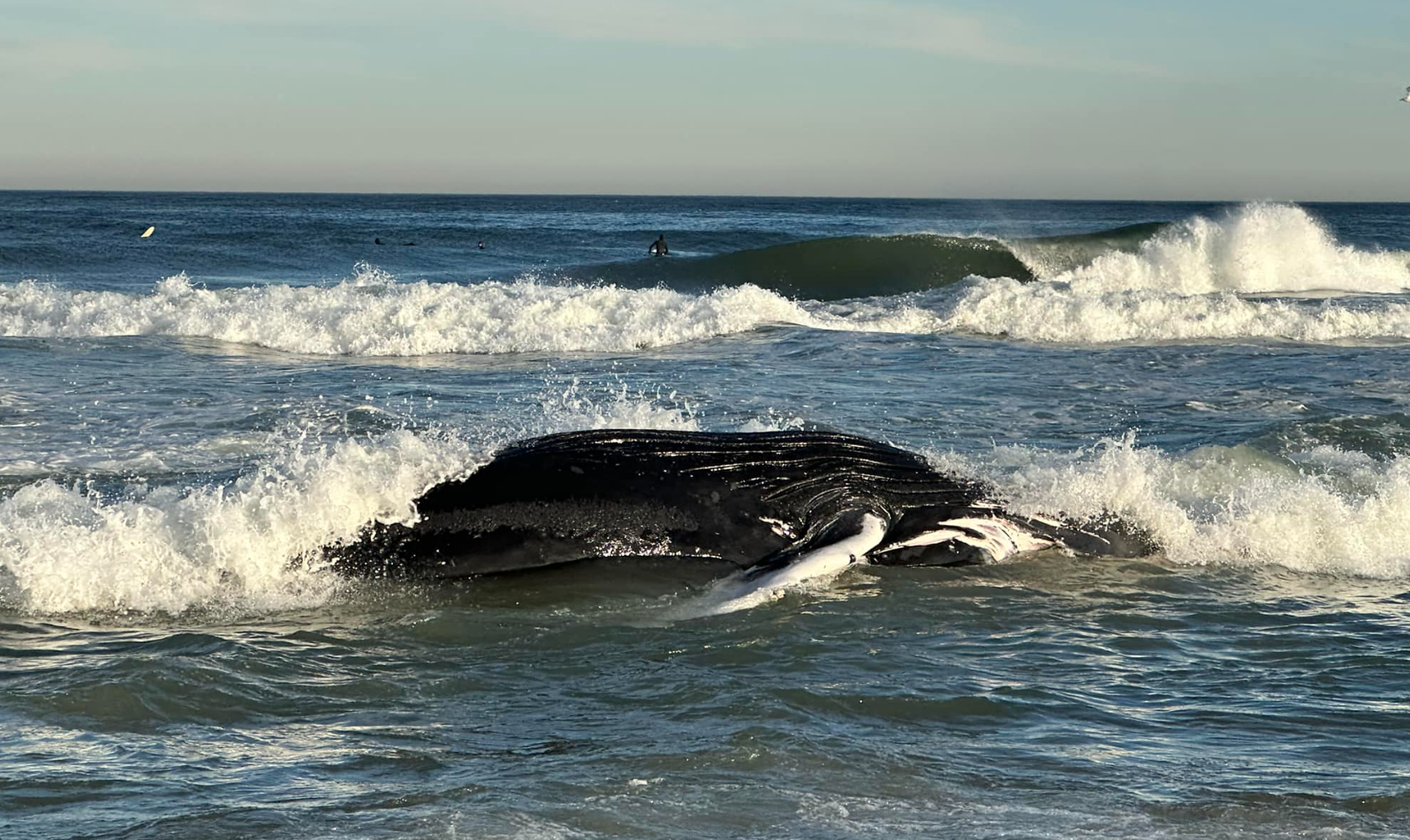This winter’s grim series of dead whales on East Coast beaches brought on a simmering public relations battle, as opponents and supporters of offshore wind energy projects work to shape the debate.
Stranded whales on New York and New Jersey beaches in December and January brought out the Clean Ocean Action environmental group and allies from beach towns and commercial fishermen who have been fighting for years against offshore wind development in the New York Bight.
They demanded that all work be suspended on offshore projects while the whale deaths are investigated. The calls grew louder in recent days, with another humpback whale and a highly endangered North Atlantic right whale found in Virginia.
Yet another whale washed up at Manasquan, N.J. Monday afternoon. One witness was Mayor Paul Kanitra from neighboring Point Pleasant Beach, who was one of a dozen Jersey Shore mayors who signed a recent letter to federal officials demanding a moratorium on offshore wind work pending an investigation of the whale deaths.
“It’s the size of a bus and it could easily come ashore in Point Pleasant Beach,” Kanitra wrote in a Facebook post, addressing New Jersey Gov. Phil Murphy. “I guarantee you if it does we will personally test it and get to the bottom of this. Governor, when do these stop becoming coincidences? How many more will it take?”
Meanwhile advocates from other pro-wind power viewpoints have been pumping out their takes since then – with environmental groups arguing that climate change is an overwhelming threat to ocean life that demands renewable energy development.
Most of the stranding victims this winter have been humpback whales. Opponents of offshore wind projects contend survey work on those projects using sonar could have contributed to the deaths. Officials with National Oceanic and Atmospheric Administration say there is no evidence for that, while they’ve been tracking an elevated level of humpback strandings since 2016 that are mostly blamed on ship strikes and fishing gear entanglement.
That debate was bound to inflame if a dead North Atlantic right whale showed up on a beach – which one did Sunday in Virginia. With just about 340 animals left in the population, they are critically endangered.
The warring groups are working to shape news media reporting, sometimes with name-and-shame memos that point out what they see as conflicts of interest among their opponents.
For offshore wind critics, their red flag is “donations, sponsorships, and grants from offshore wind energy companies” as outlined by the Save Right Whales Coalition, a group that brings together opponents in southern New England and New Jersey beach communities.
Wind power advocates fire back by highlighting links between the critics and groups that lobby against renewable energy development.
The Save Right Whales Coalition works with writer and activist Michael Shellenberger of Environmental Progress, who contends offshore wind is a waste of resources when natural gas and nuclear power can be developed. The Texas Public Policy Institute, a free-market advocacy group funded by oil and gas interests, volunteered to help southern New England fishermen in their court challenge to federal agencies that issue permits for Vineyard Wind and other offshore developers.
The American Clean Power Association, a trade group that promotes building a U.S. offshore wind industry, says those groups are promoting unfounded claims linking whale strandings to wind power survey work.
“The Jan. 26 Politics & the Nation article “Dead whales raise more uncertainty for wind power push” perpetuated misinformation by dark-money groups that offshore wind activity is linked with recent whale strandings in New Jersey,” wrote J.C. Sandberg, chief advocacy officer of the American Clean Power Association, in a Feb. 1 letter to the editor published in the Washington Post.
Fishing industry advocates who work with the conservative legal groups say they are facing an existential threat from offshore wind projects shutting them out of longtime fishing grounds. They make no apologies.
“When you’re at the point where you’re facing complete annihilation, you look for people who can help,” Meghan Lapp, fisheries liaison for Seafreeze Shoreside, a Rhode Island seafood processor and plaintiff in the Texas Public Policy Foundation lawsuit, told the New York Times in December.
Another campaign is linked to the Heartland Institute, which fights against reducing fossil fuel use. The group has worked with opponents of wind developers with federal leases off Maryland and Virginia and is bringing the right whale situation to bear in a challenge to Dominion Energy’s Coastal Virginia Offshore Wind Project.
“With only a little more than 300 individual right whales alive today, this endangered species is in dire need of protection, and the Virginia Wind Project lies directly in their annual migration path,” said David Stevenson, president of the American Coalition for Ocean Protection, when the newfound group announced its legal campaign.
Stevenson is also director for energy and environmental policy at the Caesar Rodney Institute, a Delaware-based libertarian non-profit group, which has advocated for offshore oil drilling in the Mid-Atlantic. It was an early entrant against Vineyard Wind, filing court action on behalf of a Nantucket residents.
The National Oceanic and Atmospheric Administration continues to say there’s no evidence that offshore wind projects are involved in the recent whale strandings. The position enrages wind power critics who look at NOAA permitting for wind developers that allows what the agency calls non-lethal “level B” effects on marine mammals, including disruption of their normal habits.
Some of that anger is now being channeled toward non-profit marine mammal groups that assist NOAA with whale stranding response operations, including necropsies and analysis to determine how the animals died. Several of those post-mortems showed that humpbacks died after being struck by vessels.







